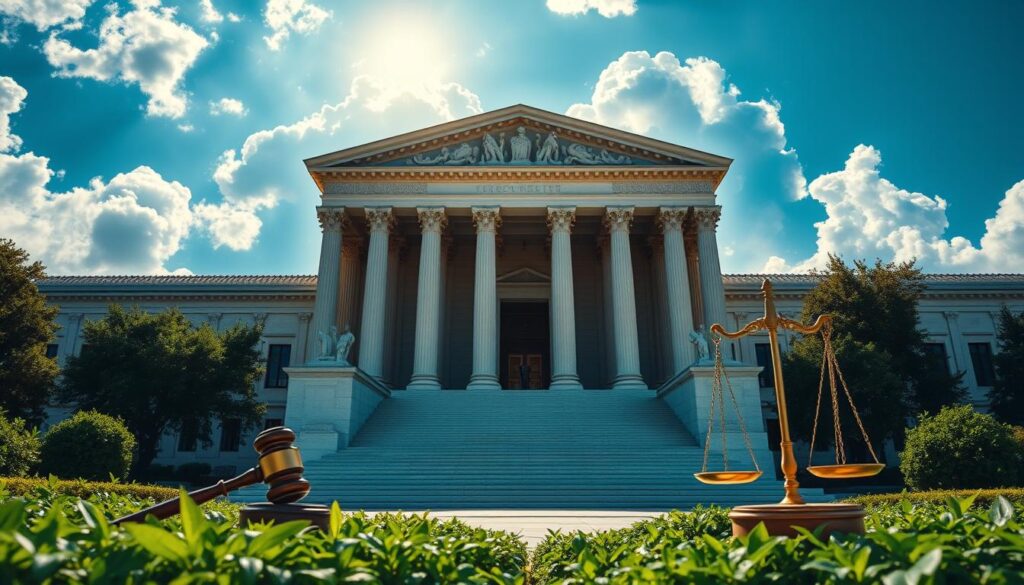The Supreme Court has made a big decision on the National Accountability Bureau (NAB) laws. This decision wraps up the Toshakhana 2.0 and Al-Qadir Trust cases. It’s a big deal for Pakistan’s politics.
This ruling ends the legal fights that lasted for a long time. It brings a sense of closure to these big cases.

Key Takeaways
- The Supreme Court’s decision on NAB laws has finalized the Toshakhana 2.0 and Al-Qadir Trust cases.
- These high-profile cases have had a significant impact on the political landscape in Pakistan.
- The court’s verdict has brought closure to these long-standing legal battles.
- The ruling has implications for the future of anti-corruption efforts in the country.
- The decision underscores the importance of the rule of law and the independence of the judiciary.
Toshakhana 2.0 and Al-Qadir Trust Cases ‘Practically Done’ After SC Ruling
The Supreme Court has made a big decision on the National Accountability Bureau (NAB) laws. This has ended the Toshakhana 2.0 and Al-Qadir Trust cases. These cases were watched closely by the public and fought in courts. Now, they are “practically done” thanks to the court’s ruling.
Background on Toshakhana and Al-Qadir Trust Cases
The Toshakhana 2.0 case is about government officials using gifts wrongly. The Al-Qadir Trust case is about money possibly taken wrongly. Both cases were big in the fight against corruption in the country. The NAB was a big part of the investigation.
Key Aspects of the Supreme Court’s Ruling
The Supreme Court looked at the NAB’s powers and how much they can do. The court said the NAB can’t do as much in the Toshakhana 2.0 and Al-Qadir Trust cases. This means these big cases are now finished.

“The Supreme Court’s decision has effectively brought these cases to a close, marking a significant development in the country’s ongoing efforts to address corruption.”
The Supreme Court’s ruling will change things a lot for the NAB and the fight against corruption in Pakistan.
Implications of the Verdict for NAB and Anti-Corruption Efforts
The Supreme Court’s decision on the NAB (National Accountability Bureau) laws has big effects on Pakistan’s fight against corruption. The ruling limits the NAB’s power, which might make it harder for them to fight corruption. This makes people wonder about Pakistan’s real commitment to fighting corruption and the role of judges in politics.
Some see the ruling as a blow to the government’s fight against corruption. With the NAB’s powers reduced, corrupt people might feel safer. This could lead to more corruption in the political system, making people doubt the government’s ability to fight corruption.
But, others think the Supreme Court made a wise move. They say the old NAB laws were too harsh and threatened basic rights. They believe this new decision will bring back the rule of law and make the judiciary more independent. This is key for a strong fight against corruption in the long run.
The Supreme Court’s recent decision regarding the National Accountability Bureau (NAB) laws has significant implications for high-profile corruption cases, notably the Toshakhana and Al-Qadir Trust cases. By finalizing the amendments to the NAB laws, the court has streamlined the legal framework governing accountability, potentially easing the path for ongoing investigations.
The Toshakhana case, which involves allegations of the improper sale of state gifts by former officials, remains under scrutiny as the court’s ruling aims to clarify the legal standards for evidence and prosecution. Simultaneously, the Al-Qadir Trust case, linked to controversial land deals involving influential political figures, has gained renewed focus under these revised regulations.
Critics argue that the changes may enable political maneuvering, raising concerns about the integrity of the accountability process. However, proponents assert that these amendments are necessary to ensure a more transparent and efficient legal framework, free from political interference. The Supreme Court’s decision marks a pivotal moment in Pakistan’s ongoing struggle with corruption, setting the stage for potential reforms while testing the balance between justice and political influence in a country where accountability remains a contentious issue. The outcomes of these cases could significantly impact the political landscape moving forward.
